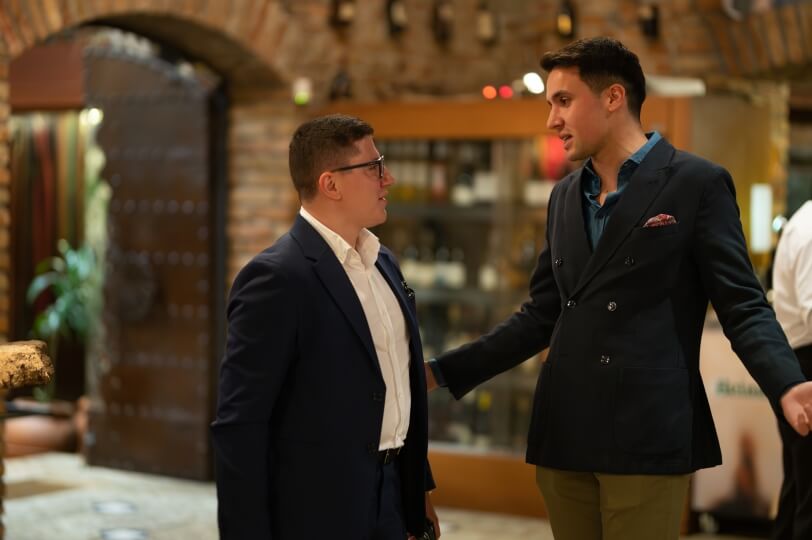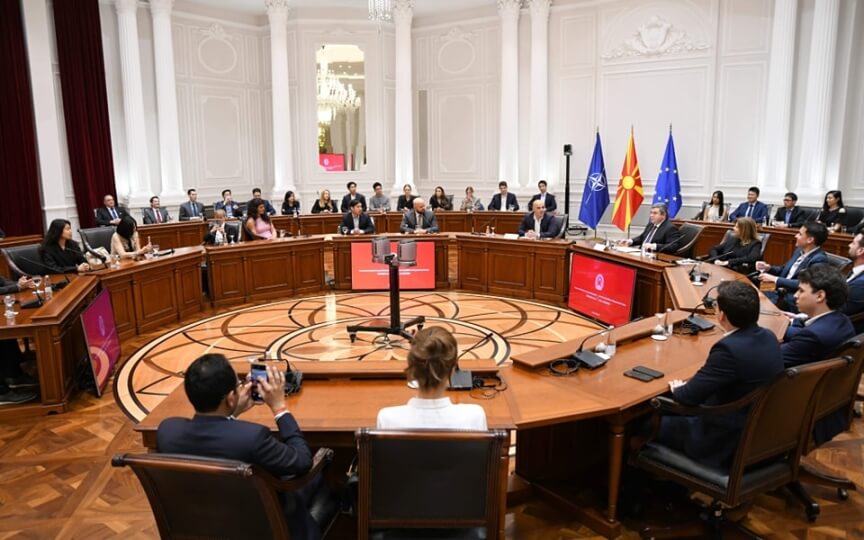Balkan Trek students at the Ministry of Foreign Affairs of North Macedonia. (Photo courtesy of Tale Lokvenec)
The Balkan region of Europe has emerged as a growing hub for tech innovation and entrepreneurship over the last few years. Serbian startups received $135 million in investment in 2021, the same year as the creation of the Open Balkan, an economic and political union of Serbia, Albania and North Macedonia whose benefits could include greater market access and collaboration for tech startups.
That kind of collaboration is exactly what Tale Lokvenec, S.M. '22, hoped to inspire when he recently co-hosted the Balkan Trek. Lokvenec, who earned a master’s degree in data science at the Harvard John A. Paulson School of Engineering and Applied Sciences (SEAS), grew up in North Macedonia, and helped introduce 54 students from SEAS, Harvard Kennedy School, Harvard Business School and MIT Sloan School of Management to researchers and policy-makers on the front lines of tech innovation in his home country.
“I’ve always been extremely passionate about providing opportunities for people in Macedonia to show off their talents and ideas, improve their network, and showcase the country and region,” Lokvenec said. “There are a lot of people working on very relevant topics to the world, and I wanted to help create a positive climate around the region.”
Balkan Trek and SEAS alum co-host Tale Lokvenec, right, with startup co-founder and chief technology officer Nikola Jordanovski at a Balkan Trek networking event. (Photo courtesy of Tale Lokvenec)
The Balkan Trek consisted of three-day stays in Serbia, North Macedonia and Albania. Lokvenec took on organizational responsibilities for the Macedonian segment, starting with a sightseeing trip and networking event that introduced the students to Macedonian tech entrepreneurs and researchers.
“I’m really passionate about the fields of machine learning, computer science and data science, so I invited participants who are young researchers, tech entrepreneurs, members of the public sector, non-governmental organization directors, and artists,” he said. “The Balkans are a region where technical skills are honed from a young age. There are a lot of very capable people here in the fields of mathematics and computer science.”
One of the core ideas behind the whole trek and (especially) the networking night in Skopje, was to showcase the youth as the driving factor of change in the region. Thus, all the invitees were between 18 and 35 years old. Also, the sectors they represented were entrepreneurship (mostly tech), researchers, members of the public sector (young MPs, advisors to the President and Prime Minister, etc.), NGO directors, artists, etc. There were no university professors present at any event (by design).
Balkan Trek students meet with Macedonian Prime Minister Dimitar Kovačevski and deputy prime minister Bojan Marichikj. (Photo courtesy of Tale Lokvenec)
The second day focused on the political and regulatory side of tech innovation as North Macedonia prepares to enter the European Union. Students met with prime minister Dimitar Kovačevski, deputy prime minister Bojan Marichikj and several other ministers, then went on two separate talk shows to discuss their impressions of the region and the potential risks of generative artificial intelligence. Lokvenec interfaced with the Macedonian government to coordinate all of those meetings.
“They were really enthusiastic,” Lokvenec said. “I think they recognized the opportunity here.”
The Macedonian segment concluded with a tour of Ohrid, a lakeside town with hundreds of churches, some over 1,000 years old. Few of the participants had ever been to the Balkans before, giving Lokvenec a chance to show off not only his home country’s technological potential, but also its culture and history.
While the majority of students on the trip were not from SEAS, Lokvenec said the exchange of ideas, especially about tech entrepreneurship, would definitely appeal to computer scientists or data engineers, should the Trek happen again.
“I was really impressed with how many cool projects were being worked on in Macedonia,” Lokvenec said. “This made me even more passionate about the project, because I wanted to show my classmates at Harvard and MIT that all these things were happening in the Balkans.”
Press Contact
Matt Goisman | mgoisman@g.harvard.edu

